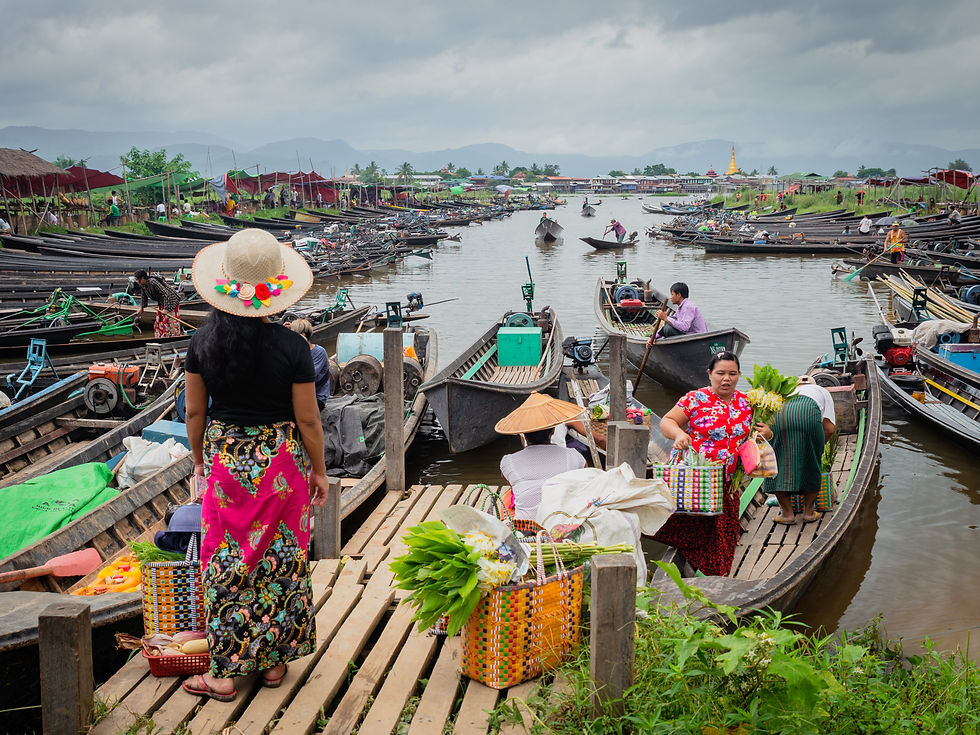
Speaking Burmese in Myanmar can greatly enhance your cultural immersion and communication experience while exploring the country.
Here are a few things you should know about speaking Burmese:
Pronunciation: Burmese is a tonal language, meaning that the tone in which you say a word can change its meaning. It's essential to pay attention to the tones when speaking Burmese.
Polite Forms: Burmese culture places importance on politeness and respect. Using polite forms of speech is appreciated when interacting with older people or those in positions of authority. Adding the word "kaun ga" (please) at the end of a sentence is a polite way to make requests.
Basic Greetings: Learning basic greetings, such as hello (mingalaba) and thank you (kyay zu tin ba deh), can go a long way in creating a positive impression and building rapport with locals.
Name Order: In Burmese, the surname or family name comes first, followed by the given name. For example, Aung San Suu Kyi is referred to as "Daw Suu Kyi" or "Daw Aung San Suu Kyi" (Daw being a respectful title for women).
Formal Titles: Burmese language uses honorific titles when addressing people. For instance, "U" is used for older men, "Daw" for older women, and "Maung" or "Ko" for younger men. It's respectful to use these titles when appropriate.
Nonverbal Communication: Burmese culture also relies on nonverbal communication. Pay attention to body language, gestures, and facial expressions to understand and convey meaning effectively.
Learning Basic Phrases: Besides greetings, learning basic phrases like "excuse me," "sorry," "please," and "thank you" will greatly assist you in daily interactions.
Greetings
Hello: Mingalaba (pronounced "min-ga-la-ba")
Goodbye: Bye-bye (pronounced like the English word)
How are you?: Neh kaun la? (pronounced "neh kahn la")
I'm fine, thank you: Neh kaun de, dhanyaba (pronounced "neh kahn de, thah-nyah-ba")
Nice to meet you: Mingalabar loh mingala (pronounced "min-ga-la-ba lo min-ga-la")
What's your name?: Nah meh be lou kor d'le? (pronounced "nah meh beh low kahr dle")
My name is ... : Nah meh be lou kor d'le (pronounced "nah meh beh low kahr dle")
Polite phrases
Please: Kyauk-sa-nee (pronounced "chauk-sa-nee")
Thank you: Dhanyaba (pronounced "thahn-ya-ba")
You're welcome: Kyauk-sa-nee (pronounced "chauk-sa-nee")
Excuse me: Mingalaba la (pronounced "min-ga-la la")
Sorry: Ma-le (pronounced "mah-leh")
Do you speak English?: Inglei saga go pyaw tat de la? (pronounced "in-glei sah-ga goh pyaw tahht deh lah")
I don't speak Burmese: Burmese mei pyaw (pronounced "bur-mah-mah mei pyaw")
Basic questions
Where is the bathroom?: Ein tha be ma shi tha le? (pronounced "ein tha beh mah shi tha leh")
How much does this cost?: Da beh-lauq-leh? (pronounced "dah beh-lauk-leh")
Can I take a photograph?: Da poun yai lo ya mala? (pronounced "dah poun yai lo ya mah-lah")
How do you say ... in Burmese?: Bama lo ... go balo pyaw leh? (pronounced "bah-mah lo ... goh balo pyaw leh")
Do you have this in a smaller size?: Dih-na a-teik loh mingala de? (pronounced "dee-nah ah-teik loh min-ga-la deh")
I'm lost: Thay-teik-cha lo (pronounced "tahy-teik-chah lo")
Food and drink
I'm hungry: Nga-ya-de (pronounced "nga-yah-deh")
I'm thirsty: Ja-ya-de (pronounced "jah-yah-deh")
Can I have a menu?: Menu di-ma? (pronounced "meh-nuu dih-mah")
What do you recommend?: Dih-na ya-de? (pronounced "dee-nah yah-deh")
This is delicious!: Aya da shi de! (pronounced "ah-yah dah shih deh!")
Can I have the bill please?: Ta-byan-da di-ma? (pronounced "tah-byan-dah dih-mah")
Other useful phrases
Yes: Htet (pronounced "htet")
No: Tet (pronounced "tet")
Okay: Kaun-ba-bi (pronounced "kahn-ba-bi")
Come here: La-de (pronounced "lah-deh")
Go away: Thwa-deh (pronounced "thwa-deh")
I'll keep looking: Ci-oun-meh (pronounced "chee-ohn-meh")
Thank you very much: Dhanyaba hsaung-hsaung (pronounced "thahn-ya-ba hsaung-hsaung")


